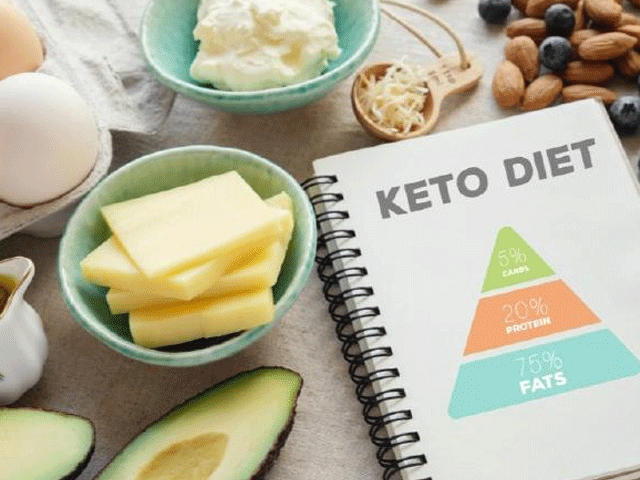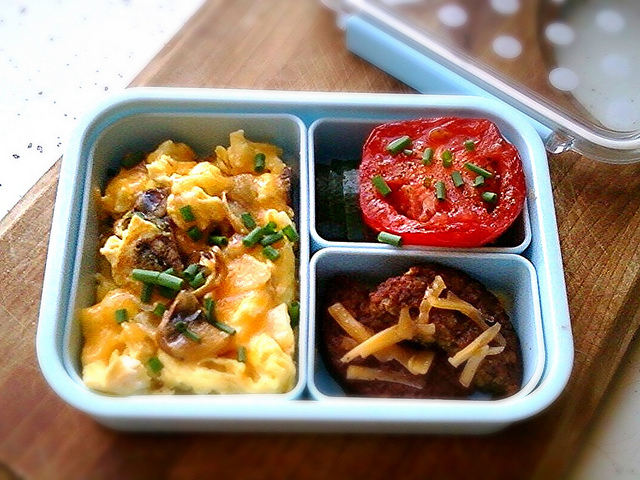Ketogenic nutrition has become known to all of us. For many, however, this form of very low-carbohydrate and high-fat diet is not only a diet, but also a lifestyle.
In a nutshell: the ketogenic diet permanently removes carbohydrates from the body, the cells look for alternative energy sources and ketosis occurs.
This enables maximum fat burning and an increased occurrence of ketone bodies in the blood.
A ketogenic diet promises comprehensive success, especially in order to lose weight and get rid of the annoying tummy.

The main advantage of a ketogenic diet is that it keeps insulin levels constantly low and thus boosts fat metabolism.
Various studies confirm that ketogenic nutrition not only promotes weight loss, but also significantly increases performance and thus general well-being (1).
However, trying out a new form of nutrition can be challenging, especially at the beginning. What can I eat to get into ketosis, how do I prepare my meals and how does it work in a restaurant?
Don’t worry – this initial frustration can be easily overcome. The smarter we are and the more we know, the easier the transition to a ketogenic diet will be and the faster you will feel the first symptoms and signs of ketosis.
Keto food list: The best foods
The ketogenic diet limits carbohydrate intake to 20-50 grams per day, depending on age, sex and weight. At first glance, this may seem intimidating, but if you familiarise yourself with ketogen-friendly foods, it will automatically work much better.
We’ve put together an ultimate list for you to use again and again.
These healthy foods are gold pieces in your ketogenic diet. Healthy, tasty and yet low in carbohydrates – perfect!
Meat and poultry
Meat and poultry should be your Go-To staple foods of a ketogenic diet.
Fresh meat and poultry do not contain any carbohydrates, but a lot of vitamin B and important minerals like potassium, selenium and zinc (29).
Meat and poultry are also an excellent source of high quality protein. Protein not only keeps you full when you eat a low-carbohydrate diet, it also helps to maintain your existing muscle mass, especially if you lose weight.
Ideally, you should only eat meat from animals that feed on fresh grass. Your meat contains a lot of healthy omega-3 fatty acids, antioxidants and conjugated linoleic acid. These in turn help to reduce body fat and weight and have anti-inflammatory effects. (32).
Avocados
Avocados contain one of the healthiest fats as they are rich in unsaturated fatty acids. These can be used as long-term sources of energy and, thanks to their high fibre content, also satisfy for a long time.
Due to the high fibre content, the regular consumption of avocados also has an effect on a regular digestion.
The power fruit is a true miracle cure and also helps to replenish the body’s electrolyte reservoir. This is especially important for athletes and athletes who lose a lot of electrolytes after a sports session due to constant sweating.
150 grams of the fruit contains 975 milligrams of potassium, a mineral that regulates the body’s fluid balance. This is very important if you are on a ketogenic diet, as the body only receives a few carbohydrates.
With a low-carb diet, the body stores less water and electrolytes, which can lead to fluid deficiency, dizziness, circulatory weakness and other symptoms of keto flu.

Nuts and seeds
Nuts and seeds usually all contain a lot of healthy fatty acids. Each nut and each seed, however, naturally contains different nutrients.
A handful of almonds, for example, already covers 10 percent of your daily calcium requirements, while the same amount of pumpkin seeds covers more than a quarter of your daily zinc requirements.
Top tip: grab some raw vegetable sticks and enjoy them with a few spoonfuls of peanut or almond butter. A healthy high-fat snack is the perfect snack for a ketogenic diet!
Here you can check the carbohydrate content of all nuts and seeds at a glance (28 grams per serving):
- Almonds: 6 grams
- Brazil nut: 3 grams
- Cashew kernels: 9 grams
- Macadamia nut: 4 grams
- Pecans: 4 grams
- Pistachios: 8 grams
- Walnuts: 4 grams
- Chia seed: 12 grams
- Linseed: 8 grams
- Pumpkin seeds: 5 grams
- Sesame seed: 7 grams
- Dark chocolate and cocoa powder
Good news for chocolate lovers: chocolate can also be part of a ketogenic diet! However, it is important that only dark chocolate with a cocoa content of at least 70% is chosen.
28 grams of chocolate with 100% cocoa, for example, has only 3 grams of carbohydrates. The same amount of chocolate with 70-85% cocoa contains up to 10 grams of carbohydrates. (92, 93).
Fish
Fish and seafood are further fixed points of a ketogenic diet. Lots of fat, few carbohydrates and a high content of vitamin B, potassium and selenium – fish such as salmon are therefore ideal for the ketogenic diet! (4).
You have to be careful with seafood, as the different fruits have different carbohydrate contents. Shrimps and other crab animals, for example, contain almost no carbohydrates, Venus or mussels, but no more (5).
Seafood is therefore definitely suitable for ketogenic diets, but these should be chosen carefully to keep carbohydrate consumption low.
Here is an overview of the carbohydrate content in a portion (100 grams) of popular seafood:
- Clams: 5 grams
- Oysters: 4 grams
- Mussels: 7 grams
- Octopus: 4 grams
- Squid: 3 grams
Ideally you should try to eat at least 2 portions of seafood per week!
Eggs
Eggs are cheap, easy to prepare and can be cooked in many different ways. Eggs are not only tasty, but also contain a lot of important nutrients such as choline.
Egg yolk is an ideal source of choline, a substance that protects cells. Choline also plays an important role in strengthening the brain, memory, metabolism and mood, according to the National Institute of Health (NIH).
Eggs are also one of the few foods that contain high levels of vitamin D, and thus support eye and bone functions and keep cholesterol levels low.
Cheese
There are hundreds of different types of cheese – and thank God they are all low in carbohydrates and high in fat, making them the perfect companion in ketosis.
For example, a portion of Cheddar cheese (about 28 grams) contains only 1 gram of carbohydrates, 7 grams of fat and 20% of the recommended daily calcium requirement (20).
Although cheese has a slightly higher content of saturated fats, studies show that it does not increase the risk of heart disease. Some studies even show that regular consumption of cheese protects against heart disease (21, 22).
Cheese also contains conjugated linoleic acid (CLA), a fat that promotes fat loss and a defined body.


